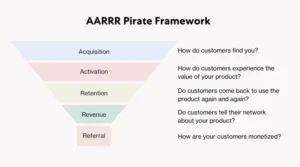
Growth Marketing Strategies in 2024: Step by step guide to create one
Growth Marketing has significantly evolved, making growth marketing strategies a cornerstone for businesses targeting robust expansion in 2024. Growth marketing focuses on more than traditional marketing tactics by emphasizing measurable results and sustainable practices. This approach often integrates the expertise of a Growth consultant to identify key opportunities for scaling the business.
Growth marketing strategies are uniquely effective due to their data-driven nature. Businesses can analyze detailed metrics to determine which aspects of their campaigns yield the highest returns. This in-depth analysis can offer insights that are critical for refining marketing efforts and allocating resources efficiently.
Companies aiming to thrive in competitive markets must adopt well-structured growth marketing strategies. These strategies involve a multi-step process designed to target specific objectives and measure outcomes effectively. Implementation requires detailed planning and a keen focus on customer engagement to foster long-term loyalty and growth.
While traditional marketing focuses on brand awareness, growth marketing goes a step further by concentrating on the entire customer lifecycle. This includes acquisition, retention, and expansion. The comprehensive nature of growth marketing ensures that every potential customer is guided through a funnel, increasing the likelihood of conversion at each stage.
A growth consultant can be instrumental in navigating this complex landscape. By leveraging industry expertise and advanced analytical tools, they help businesses pinpoint bottlenecks and develop tailored strategies to overcome them. Effective growth marketing strengthens customer relationships, drives revenue, and ensures consistent brand presence across various channels.
In 2024, businesses must be agile and adaptable to stay ahead. Embracing growth marketing strategies tailored to specific business needs can yield significant advantages. Any company seeking to scale effectively will benefit from a well-thought-out approach, continuous optimization, and a focus on long-term value creation.
Understanding Growth Marketing
Definition and Importance
Growth marketing focuses on strategies aimed at the rapid and scalable growth of a business. Unlike traditional approaches, growth marketing employs data-driven techniques and continuous experimentation to identify the most effective methods of reaching and retaining customers.
This approach is crucial because it allows companies to adapt quickly to market changes and consumer behavior. By doing so, businesses can optimize their marketing efforts and allocate resources more efficiently. A growth consultant often guides companies through this process, ensuring they implement the best practices.
Difference Between Traditional Marketing and Growth Marketing
Traditional marketing strategies often revolve around building brand awareness and attracting a broad audience through fixed methodologies. These methods include print advertisements, TV commercials, and billboards. The primary objective is long-term brand recognition, often without direct measurement of immediate impact.
In contrast, growth marketing centers on specific, measurable goals such as acquiring new customers or increasing user engagement. This approach involves constant testing, optimization, and scalability. Marketing growth tactics include A/B testing, email marketing, and social media advertising.
Traditional marketing operates through established channels with predictable outcomes. Growth marketing, however, continuously evaluates performance metrics to refine strategies. A growth consultant helps interpret these metrics to guide iterative improvements. The ability to pivot quickly based on data insights sets growth marketing apart from more static traditional methods.
Setting a Foundation for Growth
Identifying Your Target Audience
Understanding the target audience is crucial for any business aiming for growth. The first step involves conducting thorough market research to determine the demographics, interests, and behaviors of potential customers. This research helps in creating a focused marketing growth strategy.
Using tools like Google Analytics, social media insights, and industry reports can provide valuable data. This data assists in constructing a clear picture of who the audience is and what they need. A growth consultant would emphasize the importance of this stage as it lays the groundwork for all future marketing efforts.
Creating Buyer Personas
Buyer personas come into play once the target audience is identified. These personas are semi-fictional representations of ideal customers, based on real data and some educated guesses. They help in personalizing marketing efforts.
To create buyer personas:
- Gather data from customer databases, surveys, and social media.
- Identify patterns and common characteristics among the audience.
- Formulate detailed profiles, including age, job title, income, challenges, and preferences.
By understanding buyer personas, businesses can tailor their growth marketing strategies to meet specific needs and solve particular pain points. This approach ensures a more targeted and effective marketing campaign.
Competitor Analysis
Competitor analysis is a key component in establishing a foundation for growth. It involves evaluating the strengths and weaknesses of competitors within the market. This analysis helps businesses identify gaps and opportunities.
The process includes:
- Identifying direct and indirect competitors.
- Analyzing their marketing strategies, pricing, and customer feedback.
- Studying their social media presence and content marketing efforts.
A growth consultant would use this information to develop strategies that leverage competitors’ weaknesses and enhance the business’s strengths. Knowing what competitors are doing right and wrong provides valuable insights to improve marketing growth efforts effectively.
By laying a solid foundation through understanding the target audience, creating detailed buyer personas, and performing rigorous competitor analysis, businesses can set the stage for successful growth in 2024. These steps are essential in formulating a robust growth marketing strategy.
Developing Growth Marketing Strategies
Businesses aiming for significant growth in 2024 must focus on creating well-planned growth marketing strategies. A growth consultant can facilitate developing a robust plan. They emphasize clear value propositions, efficient marketing funnels, and selecting appropriate channels.
Creating a Value Proposition
A value proposition proves crucial in attracting and retaining customers. It outlines the unique benefits a business offers, setting it apart from competitors. This statement must be clear, compelling, and directly address the customer’s needs.
- Identify the target market and their primary pain points.
- Highlight the unique benefits and solutions the product or service provides.
- Ensure the proposition communicates the value in a straightforward manner.
Marketing growth professionals suggest that a strong value proposition enhances marketing efforts considerably by immediately resonating with the audience.
Building a Growth Marketing Funnel – The AAARRR Framework
Creating a successful growth marketing funnel involves guiding potential customers through stages using the AAARRR framework: Awareness, Acquisition, Activation, Retention, Revenue, and Referral.

Image Courtesy: Ortto
Awareness: Attract potential customers with engaging content marketing, social media efforts, and search engine optimization.
Acquisition: Capture leads through effective landing pages, sign-up forms, and targeted advertisements.
Activation: Encourage new users to experience the product’s value through onboarding, tutorials, and personalized emails.
Retention: Maintain engagement with regular updates, loyalty programs, and strong customer support.
Revenue: Increase sales through up-selling, cross-selling, and personalized offers.
Referral: Convert satisfied customers into advocates by implementing referral programs and incentivizing word-of-mouth marketing.
Growth marketing strategists leverage analytics to track funnel performance and make necessary adjustments to optimize conversion rates.
Selecting Appropriate Channels
Choosing the right channels while developing an effective growth marketing strategies ensures that the business message reaches the target audience effectively. Different channels serve varying purposes within a growth strategy.
- Organic Search: Utilize SEO to improve search engine rankings, driving organic traffic to the website.
- Email Marketing: Personalize email campaigns to nurture leads and maintain customer engagement.
- Social Media: Leverage platforms like Facebook, Instagram, and LinkedIn to advertise and engage with customers.
- Paid Advertising: Implement PPC campaigns on Google Ads and social media platforms for targeted reach.
Involving a growth consultant can aid in selecting and optimizing these channels to ensure a cohesive and effective marketing growth strategy.
Implementing Growth Marketing Strategies
Utilizing Social Media Marketing
Social media marketing plays a crucial role in the success of growth marketing strategies. Businesses should leverage platforms like Facebook, Instagram, LinkedIn, and Twitter to reach a wider audience. Regularly posting engaging content increases brand visibility and customer interaction.
Influencer partnerships can also yield significant results. Collaborating with influencers endorsing your products or services can increase credibility and reach. Paid advertising on social media provides targeted audience engagement, helping businesses to convert followers into customers efficiently.
Email Marketing Campaigns
Email marketing campaigns remain a cornerstone of marketing growth strategies. Personalized email content drives higher engagement and conversion rates. Analyzing customer data helps in segmenting audiences and tailoring email messages accordingly.
- Welcome emails for new subscribers establish initial contact.
- Newsletters keep customers informed about company news and product updates.
- Promotional emails with exclusive offers or discounts drive immediate action.
A/B testing of subject lines and email content ensures optimization, leading to higher open and conversion rates. A growth consultant can provide expert insights into maximizing email marketing ROI.
Content Marketing
Content marketing is essential for businesses aiming for sustainable growth. Creating high-quality, SEO-optimized content attracts organic traffic. Blogs, articles, eBooks, and whitepapers provide valuable information that resonates with the target audience.
Consistent content updates keep the audience engaged and enhance the company’s online presence. Utilizing keywords strategically within the content improves search engine rankings.
Video content, webinars, and podcasts engage users in diverse ways, broadening the scope of content marketing. Collaborating with industry experts to produce authoritative guides or research papers strengthens the brand’s reputation as a trusted source of information.
Monitoring and Analyzing Results
Monitoring and analyzing results are crucial aspects of any marketing growth strategy. These practices help businesses gauge the effectiveness of their campaigns, identify areas of improvement, and make data-driven adjustments. Continuous monitoring ensures that efforts yield the expected ROI, while analysis helps to understand customer behavior and preferences.
Key Performance Indicators (KPIs)
Key performance indicators (KPIs) are essential metrics that can measure the success of marketing efforts. KPIs clarify whether the implemented strategies align with the business goals. Common KPIs in growth marketing include:
- Customer Acquisition Cost (CAC)
- Customer Lifetime Value (CLV)
- Conversion Rate
- Return on Investment (ROI)
- Engagement Rate
- Churn Rate
A growth consultant can help identify which KPIs are most relevant to a specific business and industry, ensuring a targeted approach to monitoring progress.
Tools for Tracking Growth
Various tools can be employed to track growth and analyze marketing performance effectively. Popular options include:
- Google Analytics for web traffic and user behavior
- HubSpot for customer relationship management (CRM) and marketing automation
- Ahrefs for SEO and backlink tracking
- Social media analytics tools like Sprout Social or Hootsuite
- Email marketing analytics through platforms like Mailchimp or Constant Contact
These tools offer valuable insights and can generate reports that assist in making informed decisions for continuous marketing growth.
Adjusting growth marketing Strategies Based on Data
Adjusting strategies based on data is essential for sustaining growth. Campaigns must evolve according to customer preferences and market trends. Implementation may involve:
- Revising content to better engage the target audience
- Optimizing ad spend based on ROI and performance metrics
- Testing new channels or platforms to reach untapped audiences
- Personalizing marketing messages to enhance customer experience
A growth consultant can guide businesses through interpreting analytics and adjusting growth marketing strategies to maximize marketing growth. Proper analysis and adjustment lead to continuous improvement and are fundamental for successful growth in 2024.
Collaborating with a Growth Consultant
When to Seek Professional Help
Businesses often reach a stage where internal strategies no longer drive expected growth. This plateau necessitates the expertise of a growth consultant . If revenue stagnates despite marketing efforts, it’s time to seek professional help. Rapidly scaling businesses might also need guidance ensuring sustainable expansion and building data backed growth marketing strategies. Additionally, entering new markets or launching significant products warrants an expert’s insight to mitigate risks and maximize returns.
Choosing the Right Growth Consultant
Finding the right growth consultant involves thorough evaluation. Prioritize candidates with a proven track record in your industry. Examine case studies and client testimonials to gauge their effectiveness. Verify their methodological approaches align with your business values and goals. Ensure the consultant is well-versed in data-driven techniques and possesses a versatile skill set adaptable to your unique business needs. Clear communication and collaborative spirit are non-negotiable traits for a successful partnership. You can learn more about how to hire a growth marketing consultant and how can he/she help you develop better growth marketing strategies here.
Collaborative Frameworks
Effective collaboration hinges on establishing a clear framework. Initially, define mutual objectives and success metrics. A structured plan outlines roles, timelines, and deliverables. Regular check-ins and progress reviews ensure alignment and adaptability. Utilize project management tools for transparency and smooth coordination. Open feedback loops strengthen the partnership and enhance outcomes. Both parties must commit to ongoing learning and adjustments based on data insights for long-term marketing growth success.
Conclusion
Growth marketing strategies in 2024 necessitate a robust and adaptable approach. Establishing a dedicated growth team remains crucial. It involves identifying areas for growth through diligent research and leveraging data-driven insights.
Engaging with a growth consultant can greatly benefit businesses by providing expert guidance and fresh perspectives. Collaborative efforts between the internal team and the consultant can streamline the achievement of marketing growth.
Implementing versatile strategies and constant experimentation with various channels is essential. It ensures the adaptation to changing consumer behaviors and market dynamics. A successful strategy includes rigorous tracking and analysis of key performance indicators (KPIs) to measure progress and make informed adjustments.
Emphasizing the user experience throughout all campaigns can drive better engagement and retention. Prioritizing customer feedback and aligning services with user expectations can foster long-term loyalty and sustained growth.
Regular audits of marketing campaigns, coupled with A/B testing, can uncover performance gaps and reveal opportunities for optimization. A data-centric approach ensures more precise targeting and improved conversion rates.
Utilizing advanced tools for automation and analytics can streamline processes, freeing resources to focus on strategy and innovation. Integrating modern technologies helps maintain competitive edge and scalability.
Clear, consistent communication across all marketing channels builds trust and enhances brand reputation. Fostering a strong online presence, including effective use of social media, draws in potential customers and enhances visibility.
Incorporating these elements forms a comprehensive growth marketing plan. Staying flexible and responsive to industry trends ensures businesses remain on the leading edge. Effective growth marketing strategies require commitment, ongoing learning, and an openness to evolving methodologies.

